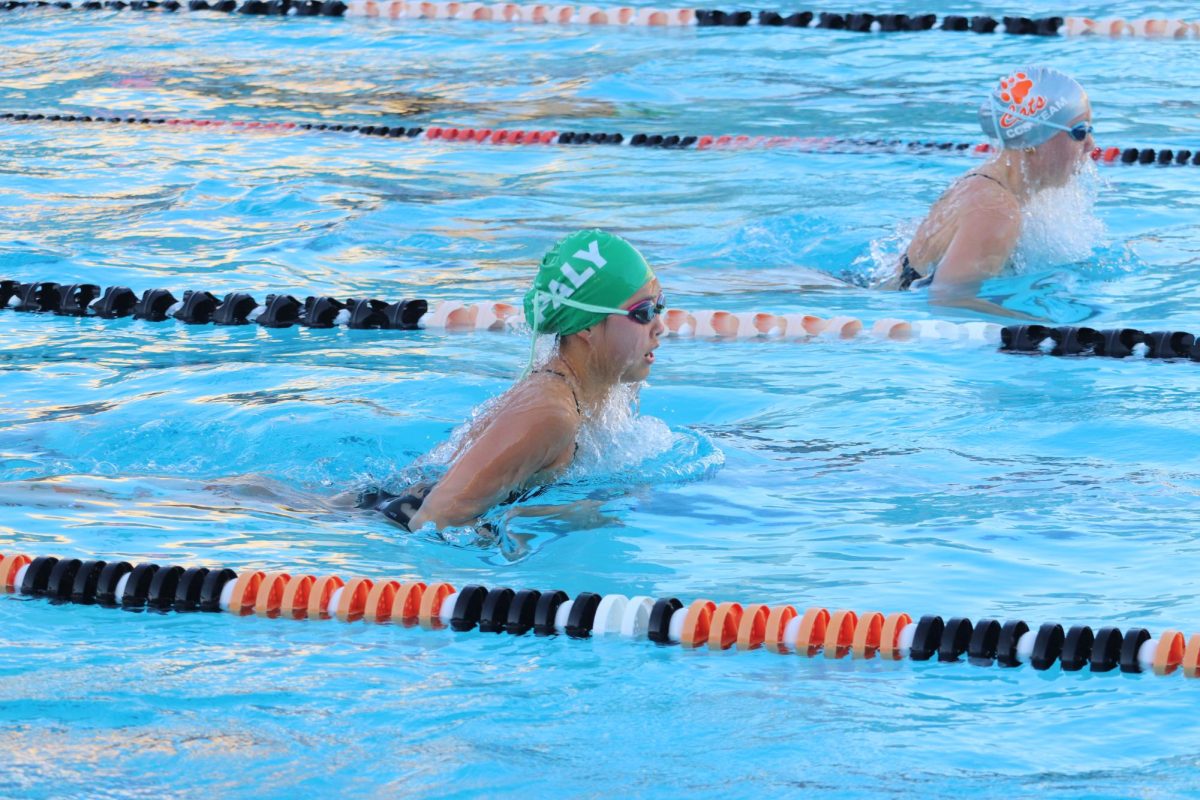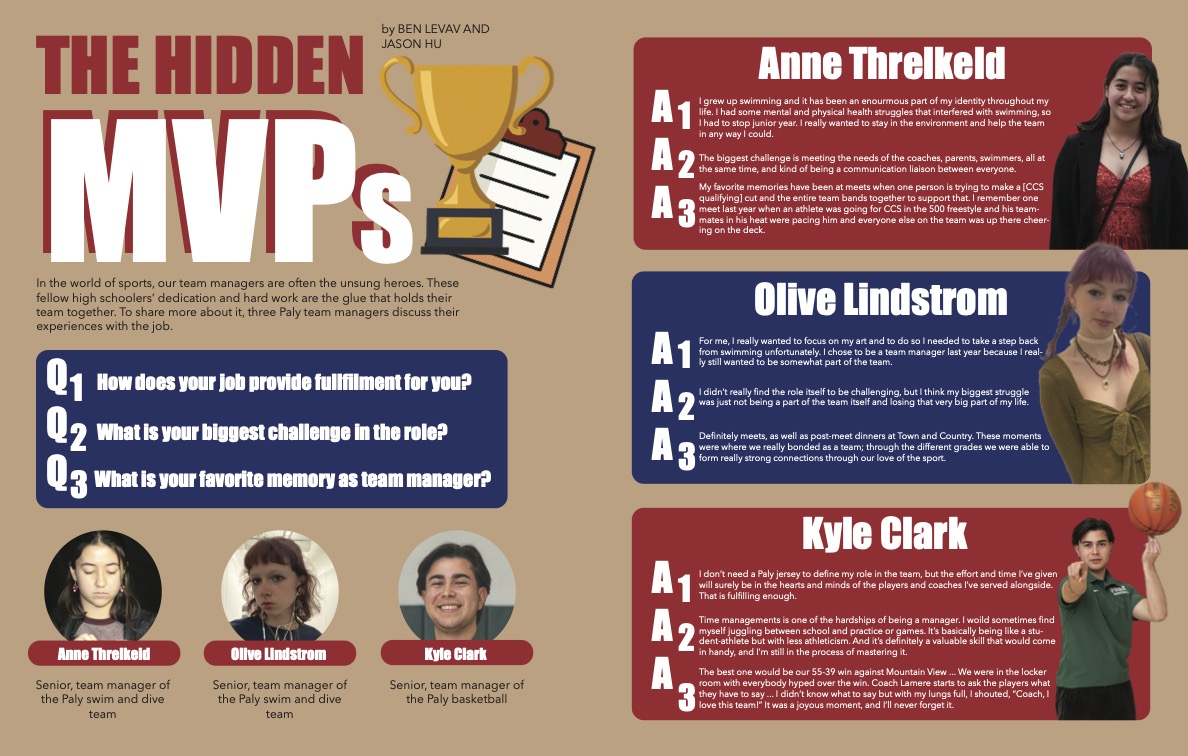Drawing the Line
October 3, 2016
She woke up on a gurney in the hospital. Confused as to why she was there, an officer told her she had been assaulted the night before. Feeling like she was in a body that wasn’t her own she was asked to sign papers that read “Rape Victim.” This is the story of rape victim, Jane Doe, who was assaulted by Brock Turner in 2015; but this is also the story of many other rape victims
Rape. The word is thrown around a lot, but what is it exactly? And what is rape culture? Both terms are thrown around frequently, but many people are unaware of what defines rape and rape culture. However, in light of recent events in relation to rape and sexual assault, it seems important that we educate ourselves on the significance of twenty-first century rape and rape culture.
Rape is the “unlawful sexual activity and usually sexual intercourse carried out forcibly or under threat of injury against the will usually of a female or with a person who is beneath a certain age or incapable of valid consent”.
In simpler terms, rape is any sexual activity that occurs without consent. Consent is an important word too. It’s not that consent is complicated in itself, but often people are unclear as to what consent means in relation to rape. Consent is purely the agreement by which both partners agree to engage in sexual activity.
However, the most important aspect of consent is that it cannot be given under any circumstances when one partner is incapacitated – meaning they are not in a mental or physical state in which they can make reasonable or rational decisions. This includes being under the influence of drugs, alcohol, or while a person is unconscious.
Now that an understanding of rape and consent has been established, we can more clearly define what rape culture is. The term rape culture was coined in the 1970’s to describe the ways in which rape and violence – mainly, but not always, toward women – are normalized in society. Today rape culture has become a more common term as more and more victims come forward and share their stories.
A recent hot button issue in relation to rape has to do with athletes. Several high profile cases of athletes involved in rape and abuse have been recently highlighted in the media. From Ray Rice abusing his wife in an elevator to the now infamous Brock Turner case, athletes have come under increasing scrutiny for troubling reasons.It can be difficult to determine whether the problem is actually becoming more commonplace, or if increased media coverage and victims’ willingness to come forward have simply made it more visible. Of course, the fact that it’s happening at all is problematic enough that it doesn’t really matter whether the rate is increasing or not. One incident is one incident too many.
A theory circulating the internet is the effect of jock culture on rape culture. The general idea of jock culture is the glorification of athletes and the praise they receive that lead one to believe that they can do no wrong. As a society, we bow down to athletes; they are our heroes, our role models, and our prized possessions. The power that society gives athletes puts them at higher risk for engaging in questionable behavior which often leads to severe repercussions.
Former college athlete Ray Gallagher recently wrote an article on Bustle titled, “I’m a Former College Athlete Who Believes Sports Culture Breeds Rape Culture.”
“Jock culture holds its athletes on a pedestal.” Gallagher writes. “If you’re the best on the field or the court, you can do no wrong. Male athletes are prized and rewarded for being aggressive, competitive, and physically dominant on the field, behavior that has a tendency to carry over off the field. Athletes are told that ‘being on the team can get you any girl you want.’ Good-looking women are no different than championship trophies.”
It’s this mindset, may would argue, that promotes rape culture. The idea that an athlete’s dominance and physical nature on the field translates to their behavior and mindset off the field is troubling at best, and potentially even dangerous.
As Gallagher writes, to many male athletes, women seem like the prize they win; the mere accomplishment of being an athlete entitles them to whichever woman they want. It also causes them to think that they are entitled because of their status, so any woman is privileged to be with them. It seems to these athletes that a perk of being an athlete is “getting the girl.”
Of course, not all athletes are going to ever think about, let alone rape or abuse others. However, athletes can be at higher risk for that mindset due to their societal glorification than their non-athlete counterparts.
Dr. Kathleen Miller of the University at Buffalo specializes in adolescent athletic involvement and problem behavior. She believes that the intersection of jock and rape culture can have dangerous consequences.
“Among well-publicized cases of male athletes committing sexual assaults (and there are a number of such cases), one common thread seems to be sexually predatory, ‘player’ attitudes toward women,” Dr. Miller said. “Elevating athletes to celebrity status — whether it’s at the pro, college, or high school level — teaches them that they are special, that rules can and will be bent on their behalf, and that they can get away with things that others can’t. That’s a potentially dangerous combination.”
As Miller states, jocks are often placed on a pedestal, whether it be in high school, college, or professionally. They are in the public eye constantly, especially male athletes in a school campus setting, where they seemingly monopolize the social scene: everyone wants to be affiliated with them. This situation further promotes the idea that athletes are the most valuable members of a community.
This hierarchy may also have something to do with an athlete’s likelihood to act differently in a social situation than they would without their athletic elitism, and may also be the reason they are often excused from punishment in cases of assault and rape.
The recent Brock Turner case – a Stanford swimmer who was convicted of rape and only served a three month sentence – has people up in arms about athlete privilege. Even though the Turner case is currently a hot topic in the media, it is not the only case the public should be aware of. Three other cases highlight the fact that Jock Culture is a wide-ranging issue and isn’t only about violence committed by men against women.
HOPE SOLO
Although she is known as one of the best women’s soccer goalies in the world, Hope Solo’s reputation was forever affected after being arrested in 2014. Solo was charged for domestic violence after allegedly hitting her nephew and half-sister while under the influence of alcohol one night. Solo states she felt threatened by her 6-foot-8, 270 pound nephew, and that he invoked her violent behavior and caused her to lash out. The nephew stated Solo had drank a lot and was visibly not in the right state of mind. After a dispute, she struck him several times. Solo’s sister entered the room to defend her son, and Solo began to hit her along with the nephew. Even after Solo’s domestic violence allegations, the U.S. National Women’s soccer did not suspend her from playing, and she was able to participate in the Rio Olympic games.
The law states that individuals charged with fourth degree domestic assault, like Solo, can receive up to 365 days in jail. Although she was held without bail, Solo was only in police custody for three days, and when she was released, plead not guilty to the chargesShe was able to plead not guilty, as she claimed that she was attempting to defend herself from her nephew. Her sister did not show up for the trial, and so because of that Solo will be up for trial again.
While popular companies like Nike dropped Solo from endorsements after her arrest, she ultimately still didn’t face the most severe consequences, which raised public controversy. Numerous similar cases cause us to wonder:do physicality and aggression on the field translate to similar behavior off the field?
BRITTNEY GRINER & GLORY JOHNSON
One of the few names that many are familiar with in the WNBA is Brittney Griner, a 6-foot-8 center who played for Baylor before becoming a Phoenix Mercury star. In August 2014, Griner proposed to her girlfriend Glory Johnson, who is also a WNBA player. In the public eye, the couple seemed happy. That is until April 2015 when Griner and Johnson were caught in the spotlight for a case of assault and disorderly conduct charges that left both in police custody.
The couple went on to get married, but both were required by the WNBA to take individual counseling and were suspended for seven games: the longest suspension in WNBA history. Although their marriage only lasted 28 days, this fight brought the problem to the view of the public.
“It is our strong belief that violence has absolutely no place in society, in sports or in this league,” WNBA President Laurel Richie said in a released statement. “As president, it is my responsibility to protect the league and uphold its values.”
Despite Richie’s support of these “values,” this is not the first time the WNBA has been linked to domestic violence. In 2011, Jantel Lavender kneed her boyfriend in the crotch which lead to a restraining order, followed by a 13-year prison sentence to Malika Willoughby for killing her partner with a gun. In 2012 Chamique Holdsclaw attacked her ex-girlfriend’s car with a bat and then fired a handgun into it. A week later, Deanna Nolan also beat her wife. The list continues, but the reason the Griner-Johnson case is so important is because they shared the same penalties.
Griner pled guilty while Johnson claimed she acted in self-defense; this means that the victim (Johnson) was blamed just as much as the assailant (Griner). The case of a man attacking a woman, which is a stereotype, is a obviously a mold that Griner and Johnson did not follow. Police only arrest both parties when they cannot identify the assailant, in this case both Griner and Johnson were arrested because they were women.
Even in this day and age, people are quick to assume the verdict of a case based solely on gender. However, the worst part is that domestic violence in the WNBA isn’t surprising anymore. How did the hyper-competitive nature of professional basketball affect women in a way that would cause violence?
BRANDON VANDENBURG
A former tight end for the Vanderbilt football team, Brandon Vandenburg was recently found guilty for campus rape. In 2013, Vandenburg, along with three other players on the Vanderbilt football team sexually assaulted, and took pictures and videos of another former Vanderbilt student. Vandenburg was responsible for sending a photo of the unconscious 21 year-old girl to several of his friends. Although there is not proof that he committed the act of rape himself, he is being held responsible for being an accessory to the crime.
On July 15, Vandenburg was sentenced to 15-20 years in jail. Although it was never officially determined that Vandenburg raped the girl, abetting (encouraging or assisting someone to commit a crime), in the state of Tennessee is also considered rape. The amount of time Vandenburg will be spending behind bars, has once again caught the public’s eye since the recent Brock Turner case.
Turner, a former swimmer at Stanford, was sentenced to six months in jail for sexual assault. In California, Turner could have been sentenced 0up to 13 years in jail for committing sexual assault. Both Turner and Vandenburg were under the influence of substances during their crimes: Turner was intoxicated, Vandenburg was on cocaine. Though both circumstances were vastly different, the two cases have raised questions as to how their sentences were determined.
California and Tennessee law differ in how each state defines rape. This has caused controversy and confusion as to how a state should define its laws in regard to rape. Rape cases tend to be drastically different and unique from one another, which has made it more challenging to define the extent to which an individual should be punished for their actions.
CASES IN REVIEW
The unique circumstances of each of these cases has made it nearly impossible to make a just conclusion in regards to how long each athlete should spend in jail. The difference between laws in each state is a factor that complicates matters as well.
Each of these individuals are exceptionally talented in the sports they play and have showcased success throughout each of their individual careers. Still, they have all committed crimes that have made the nation question whether they deserve recognition as a leader and athlete in our society. This ties back to the essential question in the Hope Solo case: does physicality and success in a sport translate to actions off the field?
Hope Solo is a two time Olympic goalie, and one of the most well known professional women’s soccer players in the country. When he arrived at Vanderbilt, Brandon Vandenburg was said to be “the nation’s [number one] junior college tight end” according to ESPN. Brock Turner was predicted to swim for the US national team and for the Olympic team. Brittney Griner was on the roster for the 2012 Olympic Basketball team, and was named the number one women’s high school basketball player in 2009.
It may seem clear to some that these athletes have committed crimes because of some connection between success in their sport. Unfortunately, it is not that easy to conclude that these acts have been committed because of success on the field or court.
However, the number of rape and abuse cases associated with successful athletes has led some to believe there is enough evidence to prove a correlation between these two, and has made it more difficult to believe that it is all just a coincidence.
According to Dr. Miller, there may be a correlation between dominance on the field translating to aggression off the field.
“When you learn to use physical aggression as an acceptable or even necessary means of solving problems or achieving goals (like scoring points in a game, or defeating an enemy, or subduing a criminal), it’s not hard for those strategies to spill over into private life as well.”
And so it comes into question whether people actually turn their heads in cases of athlete rape. Being under the microscope and up for public scrutiny many not be “the easy way out.” While Turner only served three months of his six month sentence on account of good behavior, he has also received extreme public backlash due to his short sentencing. Obviously there are both negative and positive consequences that result from committing a crime this serious as an athlete.
In commentary widely criticized by the public, the judge in Turner’s case decided on a six month sentence seemingly because of his status and promising swimming future, which to many hardly seems like a punishment at all. There’s not doubt that as a result of being in the spotlight, he can no longer live a normal life. However, critics will quickly point out that his victim’s life was also altered forever, because of his actions. So although Turner received such a short sentencing in the judicial system, he will receive the longest possible punishment in the social system: societal isolation.
Some news and media outlets have reported the story in a way in which Turner is painted as the victim. They continue to tell the story that because of one mistake he made, the rest of his life and career will be ruined. Even his father has spoken to these reports.
“That is a steep price to pay for 20 minutes of action out of 20 plus years of life,” Dan Turner wrote in a letter to Aaron Persky, the judge in Turner’s case.
This attitude sends the idea that the misfortune is not that the girl has been raped, but that the athlete’s future and reputation is tarnished. This idea fosters rape culture and often results in victim blaming; in other words: although the girl was raped, she has now ruined any future the athlete once had.
So the answer is not clean cut. Yes, athletes often benefit from the perks of being in the spotlight, but they also suffer.
However, the normalization of athletes involved in sexual assault, rape, and violence in general is increasing, meaning that it is not seen as a big deal or a shock to see an athlete involved in any of these crimes. Ultimately, this is the result of a faulty society: there is a double standard. This double standard allows athletes to commit a crime and expect to be excused, while when any other person commits the same crime, they are met with harsh punishment.
Is it this system that causes athletes to commit these crimes in the first place? Thinking they will be excused and exempt from punishment may lead bright athletes to make foolish mistakes.
With the Brock Turner case currently under the microscope, it is now the perfect time to start a conversation about rape, rape culture, and its influence over athletes. Although it seems that this is a systemic problem that will not change with the flip of a switch, over time the appropriate changes to fix it can be implemented. Now that this issue is being brought to light and recognized by the greater public, there has never been a better time to address and act on the problem.




